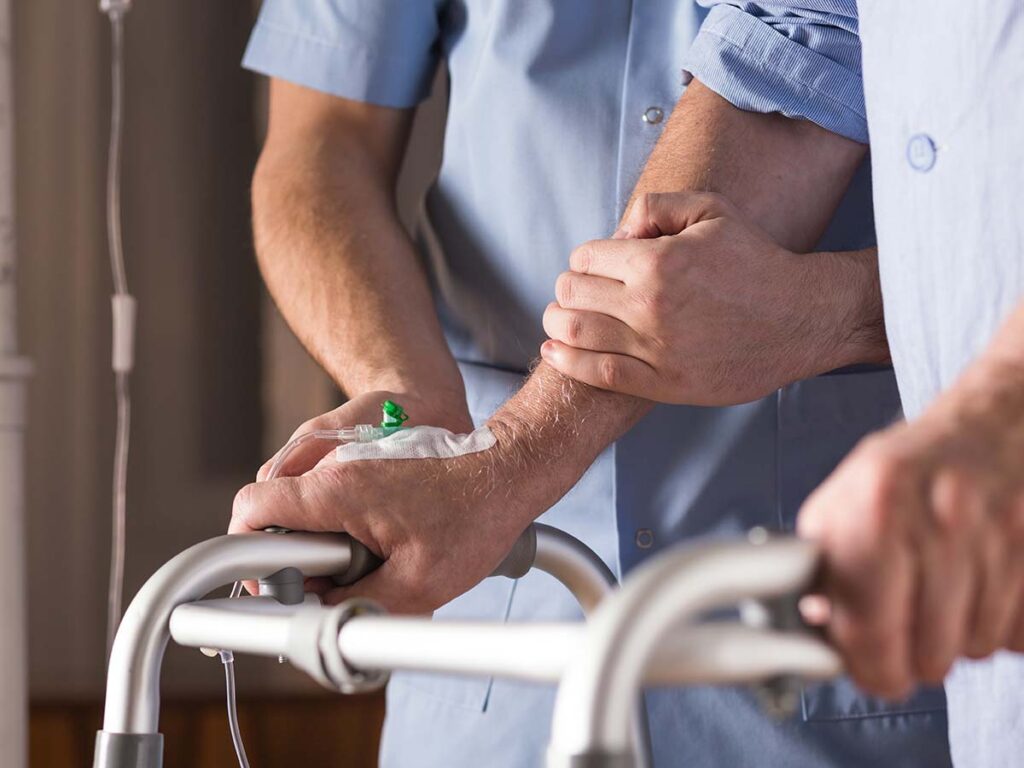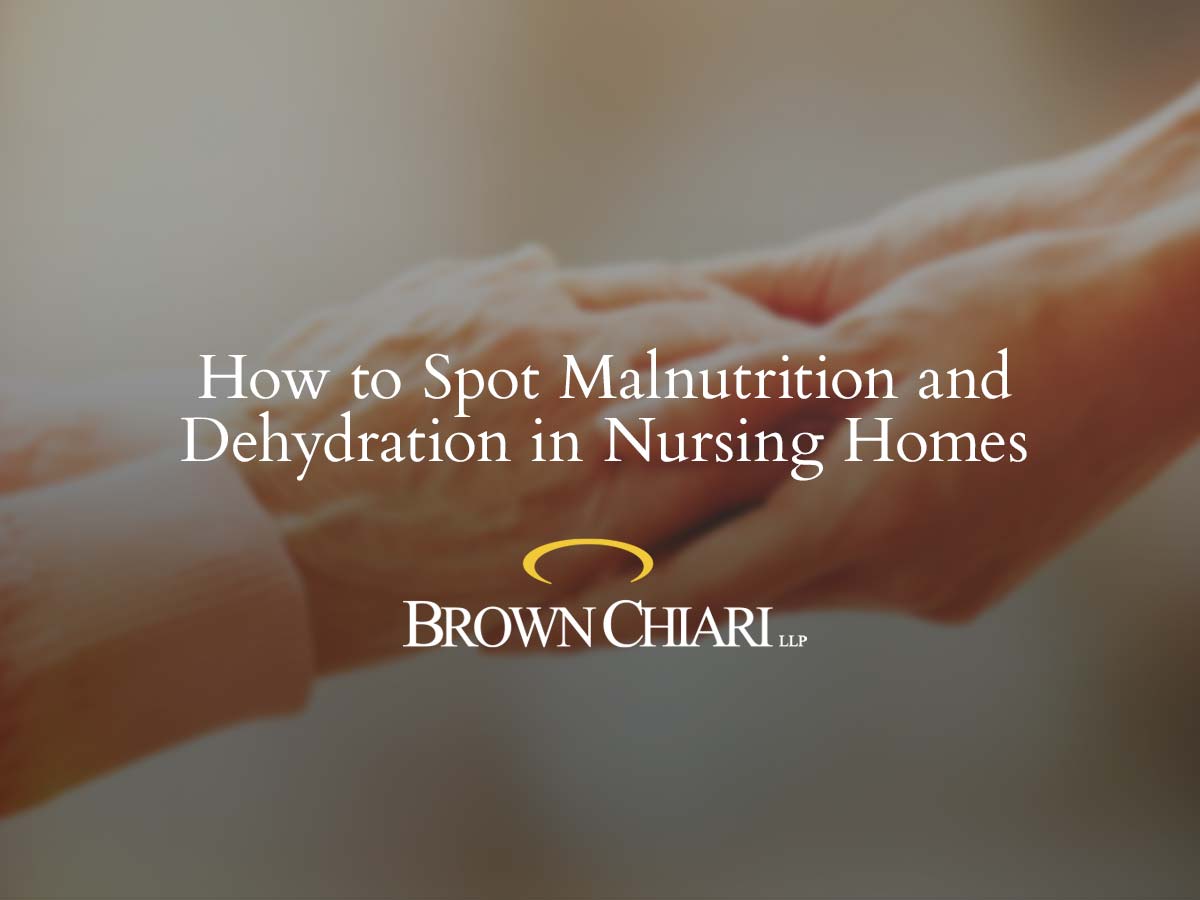Malnutrition and dehydration in nursing homes are serious issues that can lead to severe health complications, cognitive impairment, and even death. Family members of elderly residents often worry about the well-being of their loved ones, especially when signs of neglect become apparent.
Unfortunately, elderly people living in nursing home facilities face a higher risk of malnutrition and dehydration due to factors like inadequate staffing, cognitive decline, and medical conditions. Identifying the warning signs early can prevent life-threatening conditions and ensure that elderly residents receive proper care.
This guide will help you understand how to spot malnutrition and dehydration in nursing homes, the common warning signs, causes, and steps to take if you suspect your loved one’s health is at risk.

What Causes Malnutrition and Dehydration in Nursing Homes?
Both malnutrition and dehydration in nursing homes stem from multiple causes. Elderly people are at a higher risk due to age-related health conditions that affect their ability to eat and drink. Some of the key risk factors include:
- Inadequate Staffing: When there aren’t enough staff members to assist residents with eating and drinking, nursing home residents may not receive adequate nutrition or hydration. Staff shortages often result in residents being ignored or rushed through meals.
- Medical Conditions: Conditions like dementia, cognitive impairment, and difficulty swallowing increase the risk of dehydration and malnutrition in elderly residents.
- Neglect: Nursing home neglect occurs when nursing home staff fail to provide basic care, including ensuring that residents have access to fresh water, adequate amounts of food, and the assistance they need to eat and drink.
- Age-Related Changes: As people age, their sense of thirst and hunger diminishes, making it more likely that they won’t consume enough food or water.
Signs of Dehydration in Nursing Homes
Dehydration in nursing homes is a significant health threat that can lead to serious complications. If dehydration occurs and isn’t addressed, nursing home residents may experience the following signs and symptoms:
- Dry Mouth and Dry Skin: A lack of water intake can cause the mouth and skin to become dry, cracked, or flaky.
- Reduced Urine Output: Nursing home dehydration often results in less frequent urination or darker-colored urine, which may also signal health problems like urinary tract infections.
- Severe Dehydration: In extreme cases, residents may experience confusion, dizziness, and rapid heart rate. Immediate medical care is essential at this stage.
- Low Blood Pressure: Dehydration can reduce blood volume, causing a drop in blood pressure, which can lead to fainting or falls.
- Muscle Weakness: Without adequate hydration, elderly residents may feel weak or fatigued, increasing their risk of injury.
If you spot any of these signs in nursing home residents, it may be a sign of dehydration and neglect.
Signs of Malnutrition in Nursing Homes
Just like dehydration, nursing home malnutrition poses severe risks for elderly people. Malnutrition occurs when a person does not receive enough food or the right balance of nutrients. Some of the most obvious signs of malnutrition in nursing home patients include:
- Weight Loss: Rapid, unexplained weight loss is a major red flag. If nursing home residents lose weight without explanation, it may be due to malnutrition.
- Decreased Appetite: Residents may avoid eating because of dental issues, difficulty swallowing, or a lack of encouragement from staff.
- Pressure Sores: Bedsores or pressure sores can develop if a resident’s nutrient intake is insufficient to support skin health and healing.
- Muscle Weakness: Without proper nutrition, residents lose muscle mass, which can increase the risk of falls and other injuries.
- Repeated Infections: Malnourished residents often have weakened immune systems, leading to repeated infections.
If you notice these warning signs, it may be necessary to investigate whether nursing home neglect is at play.
The Role of Nursing Home Staff and Facilities
Nursing home facilities are required by federal and state laws to ensure residents receive adequate food, proper nutrition, and fresh water. Nursing home staff are responsible for assisting residents with eating, drinking, and maintaining overall health.
However, nursing home neglect can occur when facilities fail to meet their obligations. Inadequate staffing and poorly trained staff members may overlook the essential needs of elderly residents. Proper supervision and individualized care are essential to prevent health complications like dehydration and malnutrition.
If you believe a nursing home is not providing adequate care, you may be able to pursue legal action.
What Should Family Members Do If They Suspect Malnutrition or Dehydration?
If you suspect that a loved one is suffering from malnutrition or dehydration in a nursing home, take these steps:
- Document the Signs: Take notes and photos of the warning signs, such as dry mouth, dry skin, weight loss, or poor hygiene.
- Request Medical Care: Ensure the nursing home provides immediate medical care to address dehydration or malnutrition.
- Report the Issue: Report concerns to nursing home administrators, state regulatory agencies, or the Department of Health.
- Contact a Lawyer: If you believe neglect or abuse has occurred, contact a nursing home abuse attorney. A legal professional can help you seek justice and financial compensation for the harm done to your loved one.
How Brown Chiari LLP Can Help
If your loved one has experienced malnutrition, dehydration, or neglect in a nursing home, you may have grounds for a claim. Nursing home residents deserve to live with dignity, and any failure to provide adequate care is a violation of their rights. Brown Chiari LLP has extensive experience handling cases involving nursing home abuse, nursing home neglect, and wrongful death.
Learn more about how to spot malnutrition and dehydration in nursing homes. Call Brown Chiari LLP at (716) 681-7190 to schedule your free, no-obligation consultation. You can also reach us anytime through our contact page. Let us help you take the first step toward justice and recovery.
FAQ: How to Spot Malnutrition and Dehydration in Nursing Homes
1. What are the most common signs of dehydration in nursing homes?
Common signs include dry mouth, dry skin, muscle weakness, low blood pressure, and reduced urine output. If these signs are present, residents may require immediate medical care.
2. What health problems can dehydration cause in older adults?
Dehydration in older adults can cause cognitive impairment, urinary tract infections, pressure sores, and even life-threatening conditions like kidney failure or heart problems.
3. How can nursing homes prevent malnutrition and dehydration?
Nursing homes must ensure adequate staffing to assist residents with eating and drinking. They must also provide adequate food, fresh water, and liquid supplements for residents with special dietary needs.
4. What should I do if I suspect my loved one is being neglected at a nursing home?
Document the signs of neglect, such as weight loss, dehydration, or poor hygiene. Request medical care for your loved one and report your concerns to the nursing home administration and state authorities. Consider consulting with a nursing home abuse lawyer to understand your legal rights.
5. How does nursing home abuse differ from neglect?
Nursing home abuse refers to intentional harm, while neglect occurs when care providers fail to meet a resident’s basic needs, like providing adequate food, water, and medical care. Both can result in dehydration and malnutrition.
6. Can I file a legal claim if my loved one suffers from dehydration in a nursing home?
Yes, you may have grounds for legal action. Contact a personal injury attorney to discuss how you can seek justice and financial compensation for your loved one’s suffering.
This blog has incorporated the following keywords:
- Primary Keywords: how to spot malnutrition and dehydration in nursing homes, dehydration in nursing homes, nursing home abuse, nursing home neglect, nursing home residents, nursing home malnutrition, nursing home dehydration.
- Secondary Keywords: older adults, elderly people, malnutrition and dehydration, dehydration, food, medical conditions, risk factors, inadequate staffing, family members, fresh water, immediate medical care, health complications, cognitive impairment, low blood pressure, wrongful death, pressure sores, liquid supplements, poor hygiene, life-threatening conditions, financial compensation, and more.
This article provides a comprehensive guide on identifying dehydration and malnutrition in nursing homes, empowering families to protect their loved ones. Let me know if you’d like any adjustments or additions to this blog.
